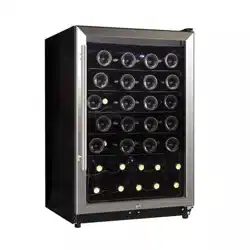Loading ...
Loading ...
Loading ...

Maintenance Service and Troubleshooting
F. Leakage Current
1. Slight leakage current
Electrical insulator has deteriorated due to dampness, thus resulting in a
slight leakage current.
2. Serious leakage current
Refrigerator has become electrically charged due to an electrical problem
or faulty wiring in power cord or outlet. This is extremely dangerous.
3. Leakage current test
a. Slight leakage current: A tingly sensation will be felt if the metal parts of
the refrigerator are touched. When tested with a test pencil, the neon
light will turn on. In that case, determine if the grounding was properly
done. If it was, turn off the refrigerator, and check the insulation of the
electrical circuits with a voltmeter.
b. Serious leakage current: Never touch the refrigerator casing, its door
handle, or other metal parts. Test the refrigerator with a test pencil; the
test pencil should light up brightly. Next, measure the resistance between
the power cord and the casing with a voltmeter; the reading should be
zero ohms (Ω). At worst, there is a blown fuse. Check the three-prong
outlet to see if the live and neutral wires were inverted, which will turn the
power plug’s ground prong into a live wire. Another possibility is that the
live wire and neutral line of the outdoor power supply circuit have been
inversely connected, making the neutral wire become live.
G. Strong Vibrations and Loud Noises
1. Refrigerator placed improperly
a. Uneven ground will cause the refrigerator to be unsteady, causing large
vibrations and loud noises during operation.
b. If the leveling screws have not been adjusted properly, vibrations and
noises will occur even if the refrigerator has been placed on a levelled
ground.
2. Abnormal noise from compressor
Suspended springs inside the compressor casing are out of balance and
strike against the casing. Worn compressor parts may also cause noise.
3. Echo in tubing and loose parts
Improperly laid or tightly packed tubes or loose parts may cause vibrations
and noise.
28
Loading ...
Loading ...
